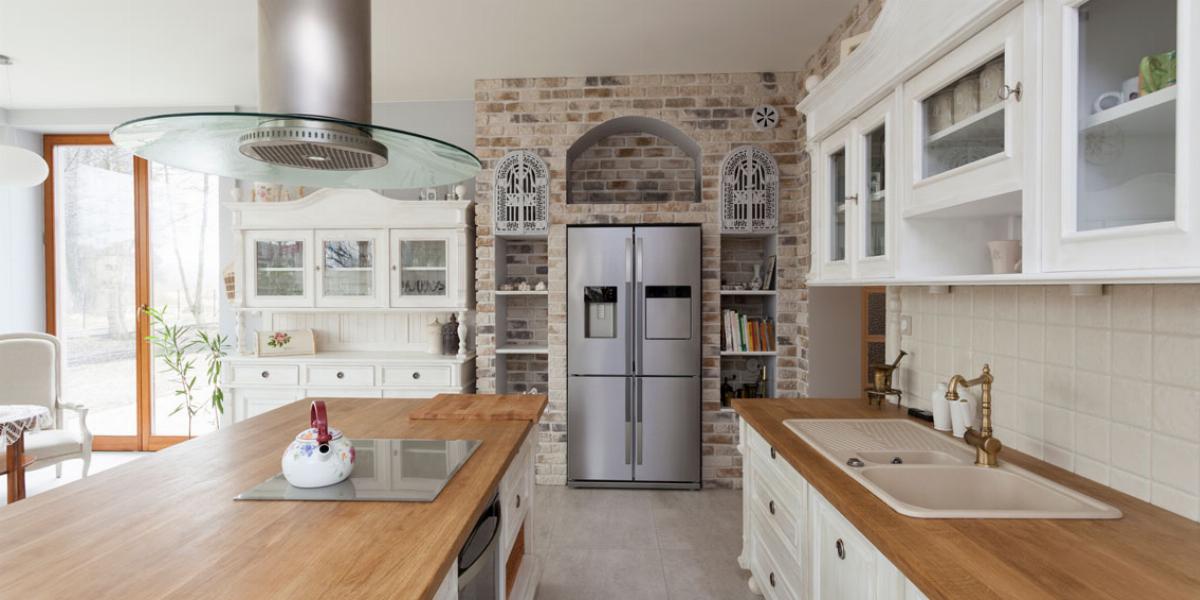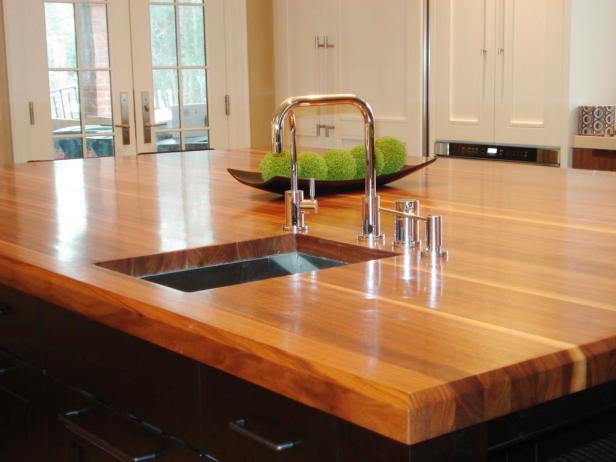Butcher block countertops offer a unique and appealing option for homeowners looking for warmth, character, and practicality in their kitchens. One of the standout benefits of butcher block is its natural, organic aesthetic. Unlike stone or composite materials, butcher block brings a sense of comfort and warmth to a space, making it feel more inviting. The wood’s rich grain patterns and natural tones add depth and texture, creating a homier environment. For those who appreciate a rustic, traditional, or even farmhouse look, butcher block countertops are a great choice. They can seamlessly blend into a wide variety of kitchen styles, from modern to vintage.
Another major benefit of butcher block countertops is their eco-friendliness. The butcher block is made from wood, which is a renewable resource. Many butcher block options are made from sustainably harvested trees or reclaimed wood, allowing eco-conscious homeowners to make greener choices. Additionally, wood has a lower environmental impact during production compared to materials like granite or quartz. The manufacturing process for wood countertops is generally less energy-intensive, and at the end of its life cycle, wood can be recycled or composted, making it an environmentally responsible choice.
Butcher block countertops are highly versatile, both in terms of functionality and customization. They come in a wide variety of wood types, including maple, oak, cherry, and walnut, each with its distinct grain pattern and color. You can also choose from different thicknesses and edge profiles to suit your kitchen design. Plus, wood can be stained or treated to match specific color schemes, making it easy to personalize. Functionally, the butcher block serves as both a countertop and a cutting surface, reducing the need for additional kitchen tools. However, it’s important to note that regular maintenance, like oiling and sealing, will be required to keep it in top condition.
One of the most practical advantages of butcher block countertops is their ability to be easily repaired. Unlike stone or laminate surfaces that may require a professional to fix chips or scratches, wood countertops can be sanded down to remove imperfections. This makes butcher block countertops a great long-term investment because any wear and tear can be restored relatively easily, keeping your counters looking fresh for years to come. It also means that small accidents, like knife marks or water stains, don’t spell disaster.

Butcher block countertops are also relatively cost-effective compared to other premium countertop materials. While exotic wood species and custom designs can be more expensive, many butcher block options are more affordable than high-end stone countertops. For those on a budget, butcher block offers a high-end look without the same price tag. The installation process is also simpler and less costly than that of stone countertops, which often require specialized equipment and professionals to install. For DIY enthusiasts, butcher block can even be installed as a weekend project with the right tools and know-how.
Wood is also a naturally hygienic material. Studies have shown that bacteria do not thrive on wood surfaces as they do on some other countertop materials. Wood’s natural antibacterial properties make butcher block countertops safer for food preparation. However, proper maintenance, such as cleaning with mild soap and water, is necessary to keep the surface sanitary. Regularly oiling the surface also prevents cracking and keeps the wood in good condition, allowing it to continue serving as a functional and safe kitchen surface.
Temperature is another area where butcher block countertops excel. Wood is a poor conductor of heat, which means that it remains cool to the touch, even in a warm kitchen. This can make working in the kitchen more comfortable. Additionally, because wood doesn’t absorb heat like stone countertops, you won’t have to worry about burning yourself if you accidentally place a hot pot or pan on the surface. However, you should still use trivets or pot holders to avoid potential scorching marks.

The flexibility of butcher block countertops also extends to design versatility. These countertops can be paired with a wide variety of cabinetry and fixtures to achieve different design aesthetics. Whether you’re going for a minimalist, sleek kitchen or a cozy, cottage-inspired space, butcher block fits right in. It pairs beautifully with metals, tile backsplashes, and stone floors. The contrast between the natural warmth of wood and cooler materials like stainless steel or glass adds a dynamic element to the kitchen design.
Butcher block countertops age gracefully, developing a beautiful patina over time. The natural wear that comes from everyday use, like scratches and nicks, can add to the countertop’s character. This patina adds depth and richness to the wood, making the kitchen feel more lived-in and personalized. Unlike other materials that may look worn out with age, wood tends to become more visually appealing as it matures.
Another benefit of butcher block countertops is their sound-dampening qualities. Wood is much quieter than stone or metal surfaces. When you place dishes, utensils, or appliances on a butcher block countertop, the sound is muted. This can be particularly appealing in open-concept spaces where noise travels more easily. The softer surface also makes it more comfortable to lean or rest your arms on, which can be a small but meaningful difference when spending a lot of time in the kitchen.

Butcher block countertops are not just for the kitchen; they can also be used in other areas of the home. Some homeowners choose to install them in laundry rooms, offices, or craft spaces. The warmth and texture that butcher block provides can bring a cohesive feel when used in multiple rooms. Its durability and easy maintenance make it ideal for high-traffic areas.
The installation of butcher block countertops is relatively straightforward. Many people opt to install them on their own as a DIY project. All that’s typically required are basic carpentry skills and tools. Because wood is lighter than stone, it’s easier to maneuver during installation, making it less physically demanding. For those who prefer to hire a professional, the installation cost is still usually lower compared to other materials.
One of the less-discussed benefits of butcher block countertops is the way they can improve indoor air quality. Many synthetic materials used for countertops can off-gas volatile organic compounds (VOCs), which can contribute to indoor air pollution. Wood does not off-gas, and when treated with natural oils rather than chemical sealants, it provides a healthier indoor environment. For families concerned with air quality, butcher block countertops offer peace of mind.

Butcher block countertops offer a timeless look that never goes out of style. Unlike trendy materials that come and go, wood has been used in homes for centuries and remains a classic choice. It adds a sense of permanence to your home, giving it a long-lasting appeal. Plus, the ability to sand and refinish means your countertops can be updated without needing to be replaced, ensuring they stay in style for the long haul.
Lastly, butcher block countertops create a strong connection to nature. There’s something grounding about incorporating natural materials into your home, and wood in particular has a calming effect. It softens the kitchen’s overall look, making the space feel more welcoming. For those who enjoy cooking or baking, the tactile experience of working on wood adds an extra layer of enjoyment.

Common Mistakes to Avoid
One common mistake is failing to properly seal and maintain the wood. The butcher block needs to be regularly oiled to protect it from moisture and prevent cracks. Another mistake is using the countertop as a cutting board without consideration for deep cuts, which can weaken the surface over time. Not using trivets for hot pans can also cause burn marks. Lastly, choosing the wrong type of wood can lead to durability issues, so make sure you select a wood that matches your kitchen’s demands.

How often do I need to oil my butcher block countertops?
It’s best to oil your butcher block countertops every month, especially in the beginning. The more you oil it, the better protected it will be against moisture and wear. Once it’s well-seasoned, you might only need to oil it every few months. This helps to maintain the wood’s durability and appearance, ensuring it remains resilient to daily use.
Can I use my butcher block countertop as a cutting board?
Yes, but it’s important to note that continuous cutting can cause deep knife marks, which may damage the surface over time. While butcher block is durable, it’s still a good idea to use a separate cutting board for heavy-duty chopping. If you do use the countertop directly, remember that sanding and refinishing can easily restore its appearance.
How do I clean my butcher block countertops?
Butcher block countertops should be cleaned with mild soap and water. Avoid using harsh chemicals that can damage the wood or strip its natural oils. After cleaning, it’s crucial to dry the surface thoroughly to prevent water damage. You can also disinfect it with a solution of water and white vinegar to kill any bacteria naturally.

Are butcher block countertops resistant to heat?
While wood is a poor conductor of heat, it’s still possible for hot pots and pans to leave burn marks on butcher block countertops. It’s always recommended to use trivets or hot pads to protect the surface from direct heat. The good news is, if burn marks do occur, you can sand them out and refinish the area.
What type of wood is best for butcher block countertops?
Maple is the most popular choice due to its hardness and durability, but other woods like oak, walnut, and cherry are also commonly used. Each type has its advantages in terms of color, grain pattern, and hardness, so it’s important to choose a wood that fits both your aesthetic and functional needs.
How long do butcher block countertops last?
With proper care and maintenance, butcher block countertops can last for decades. The ability to sand and refinish them makes them a long-lasting option. As long as you stay on top of oiling, cleaning, and preventing moisture damage, these countertops will remain beautiful and functional for many years.

Related articles:
- Can You Paint Butcher Block Countertops
- Butcher Block Countertops With White Cabinets
- Pine Butcher Block Countertops
- Butcher Block Countertops Walnut
- Maple Butcher Block Countertops
- Care Of Butcher Block Countertop
- Butcher Block Countertops Maintenance
- Antique Butcher Block Countertops
- Butcher Block Countertop Sealing
- Wood Butcher Block Countertop